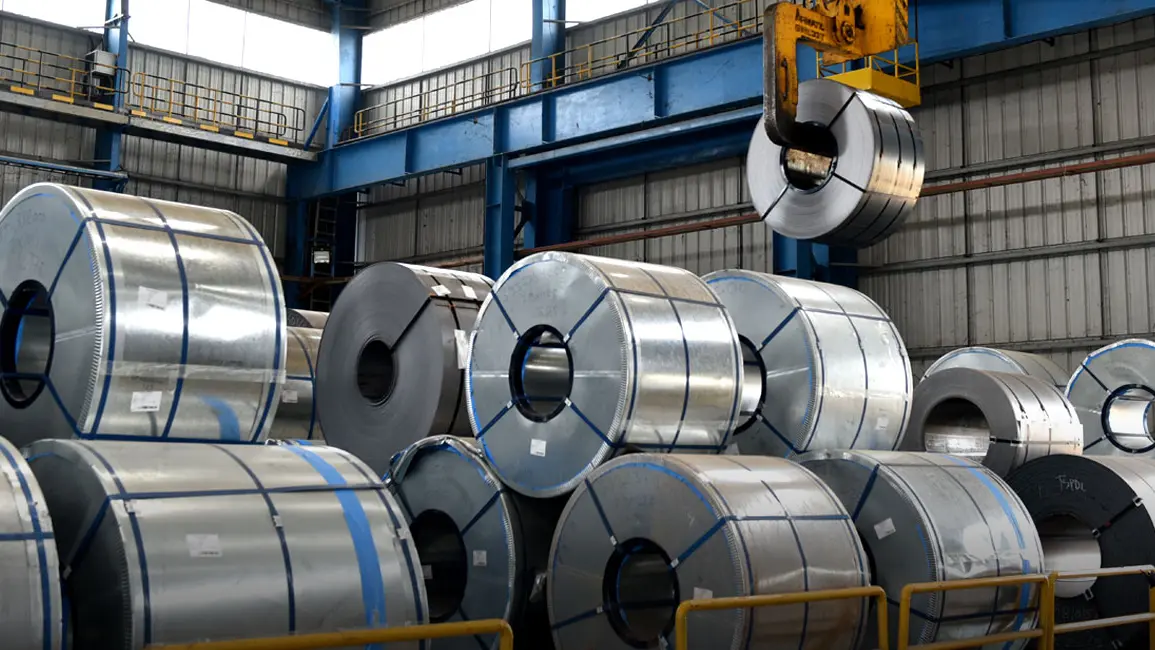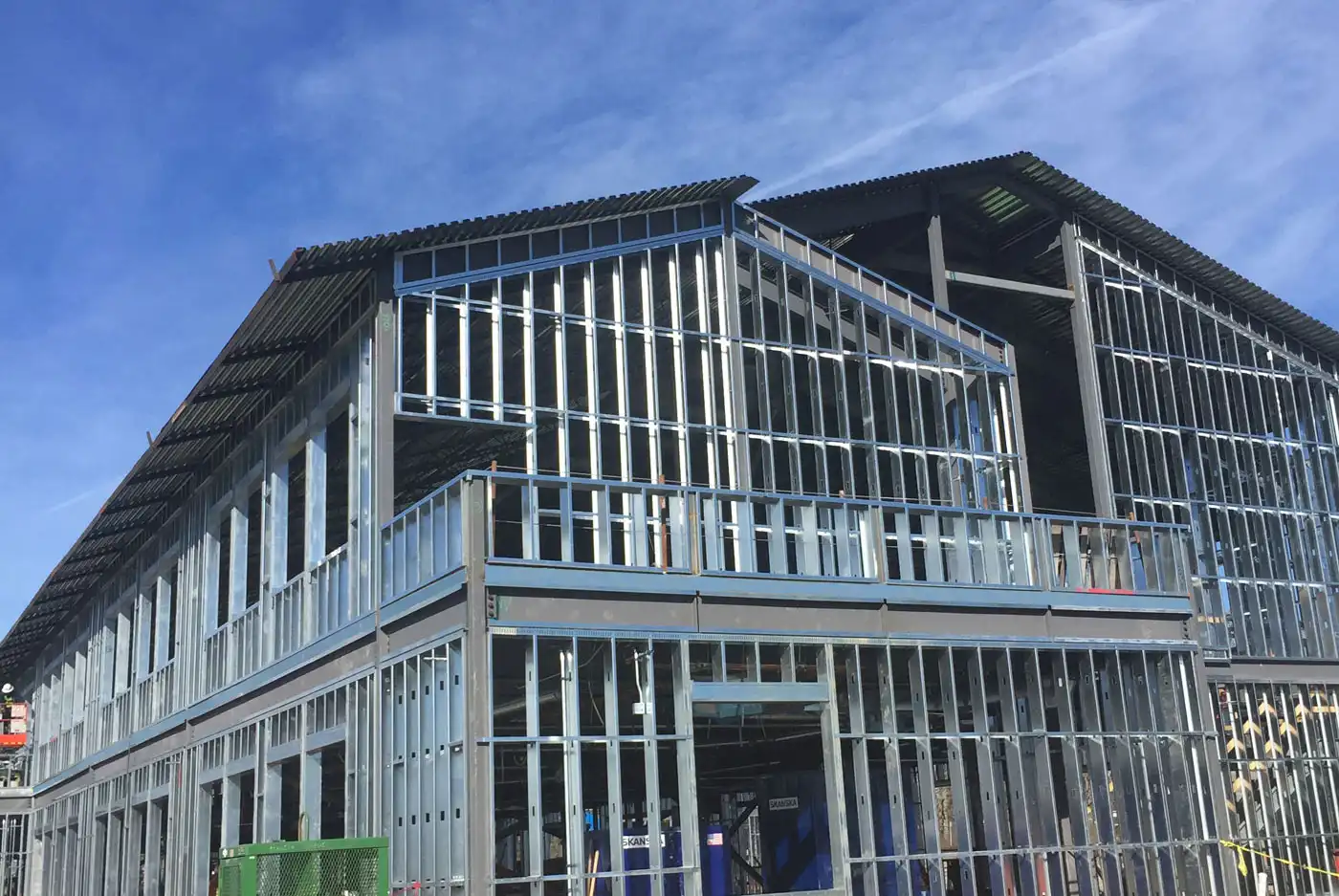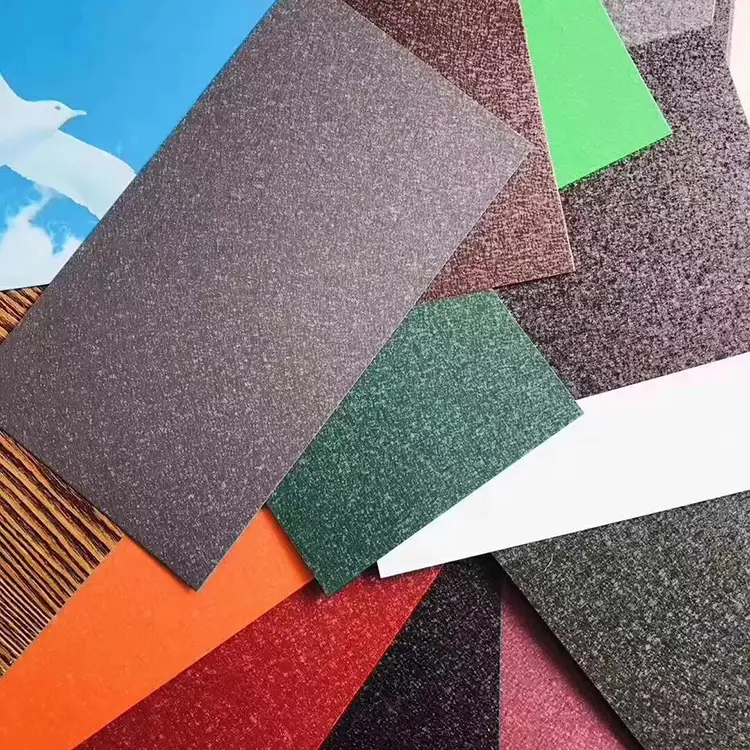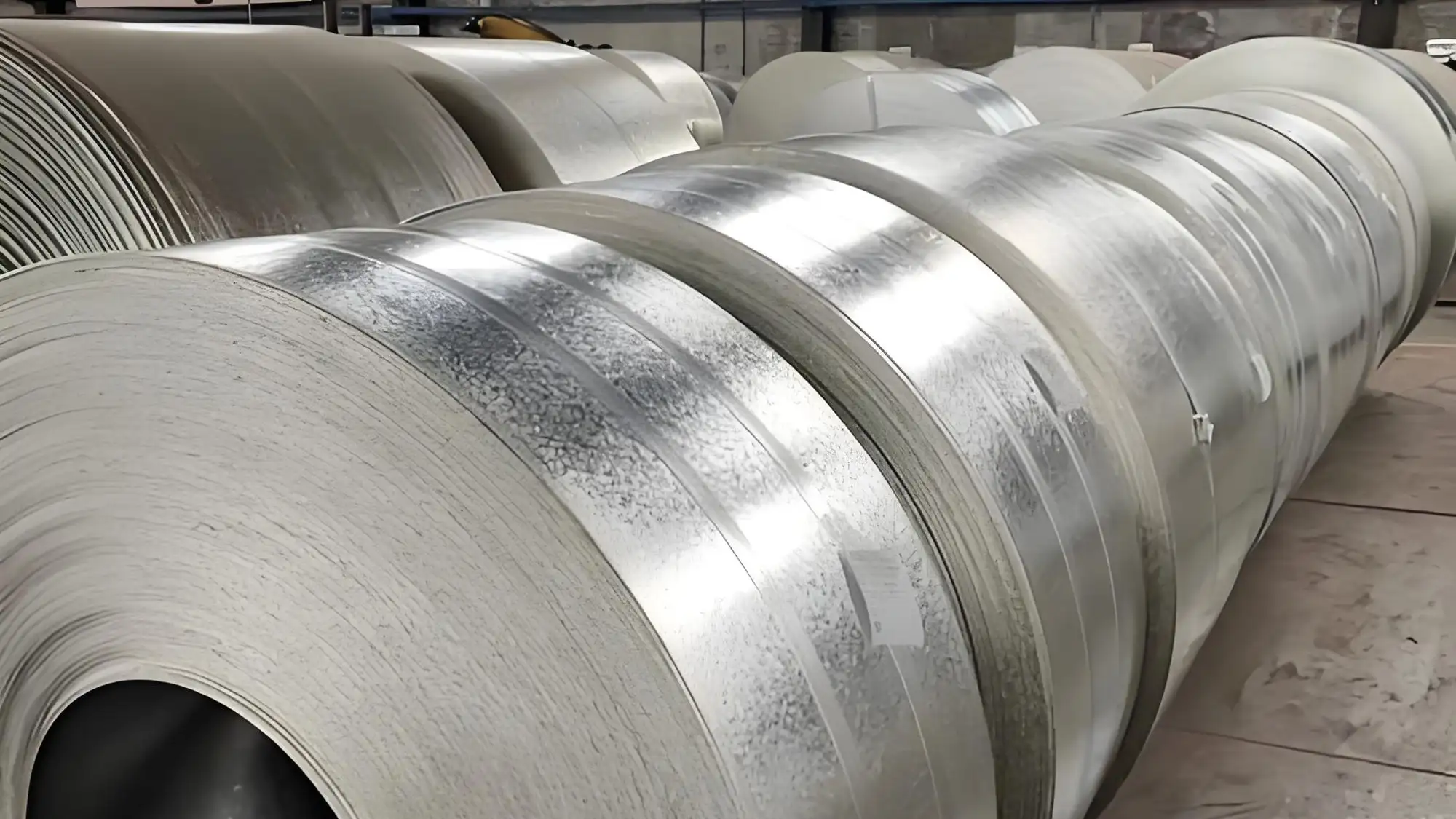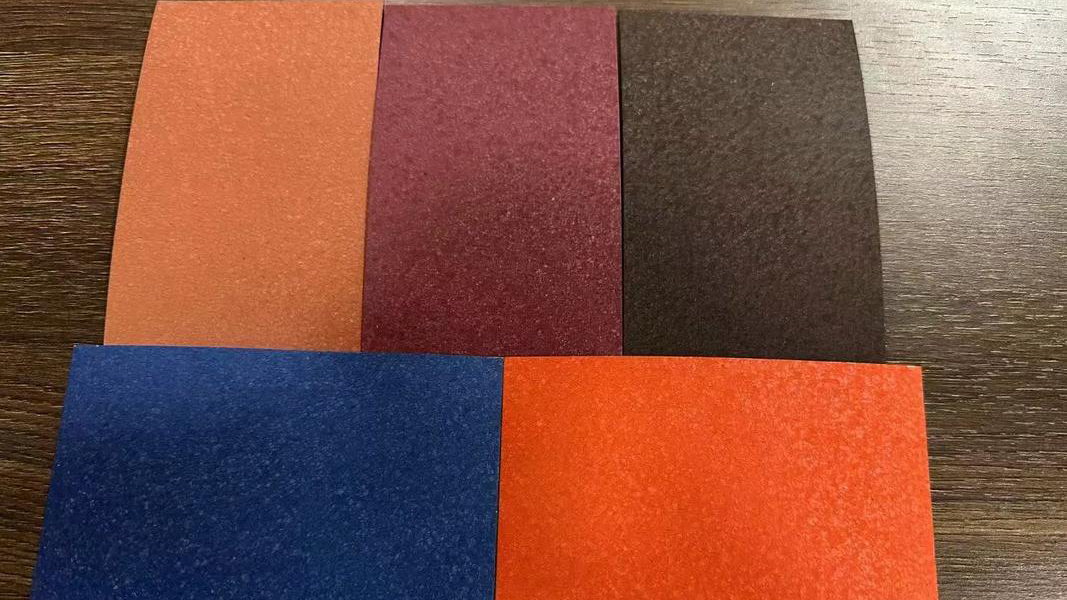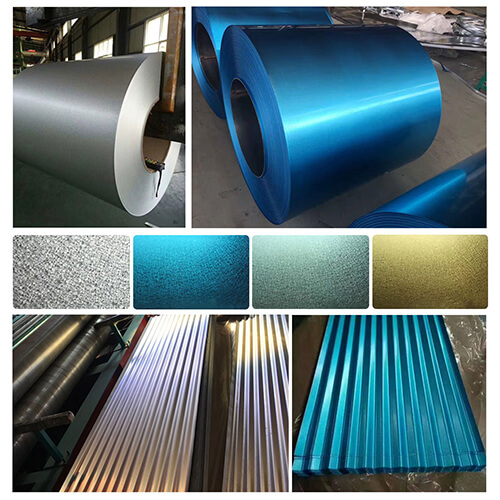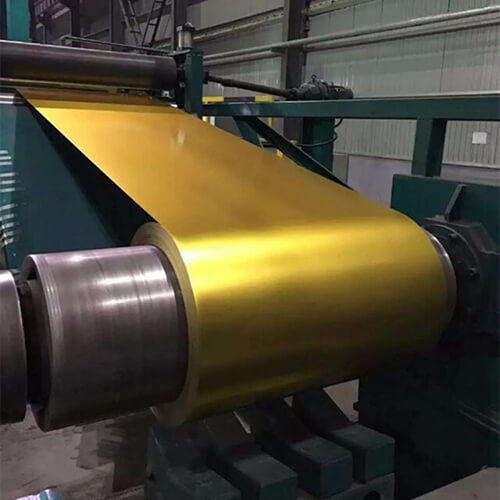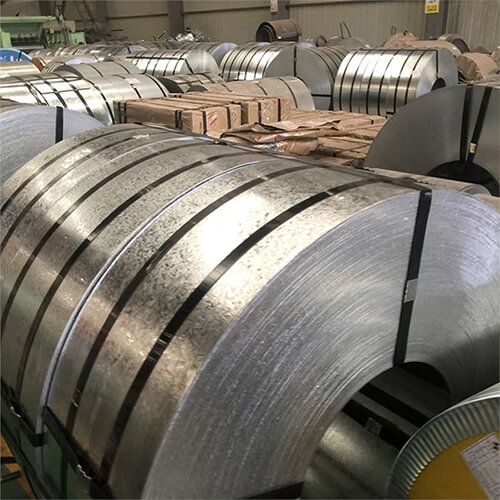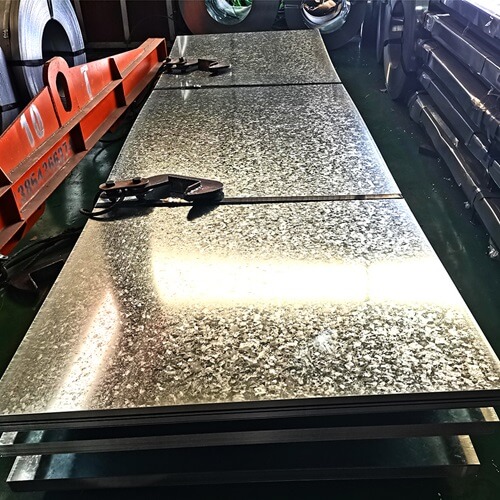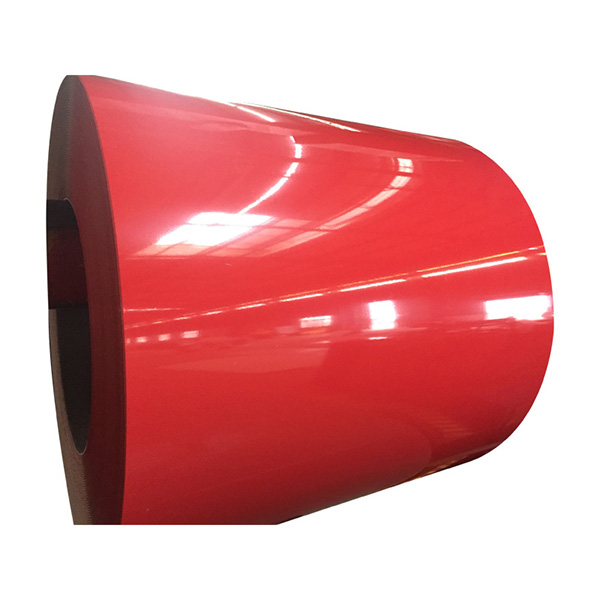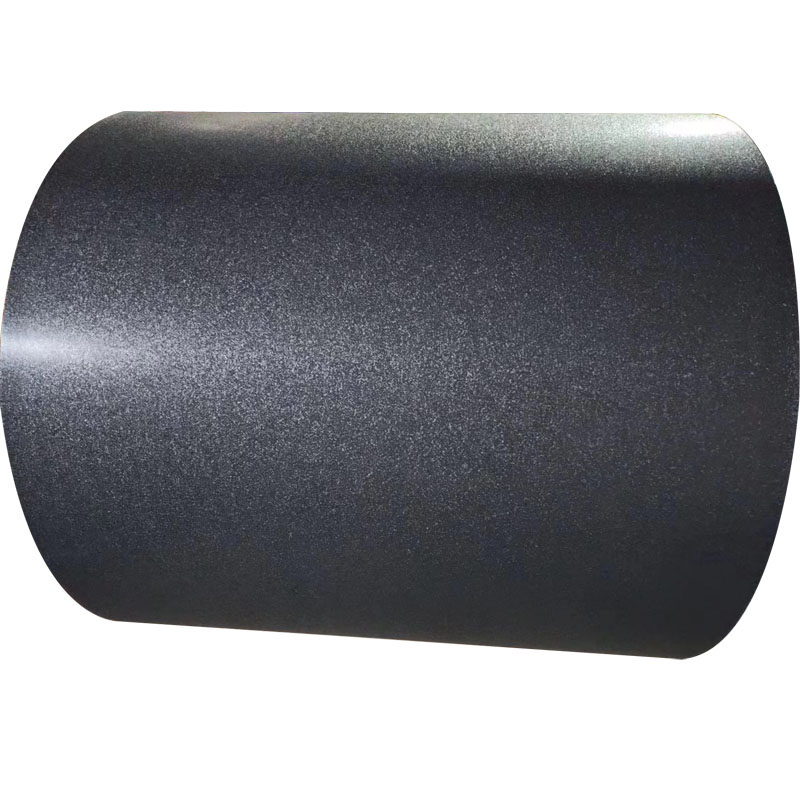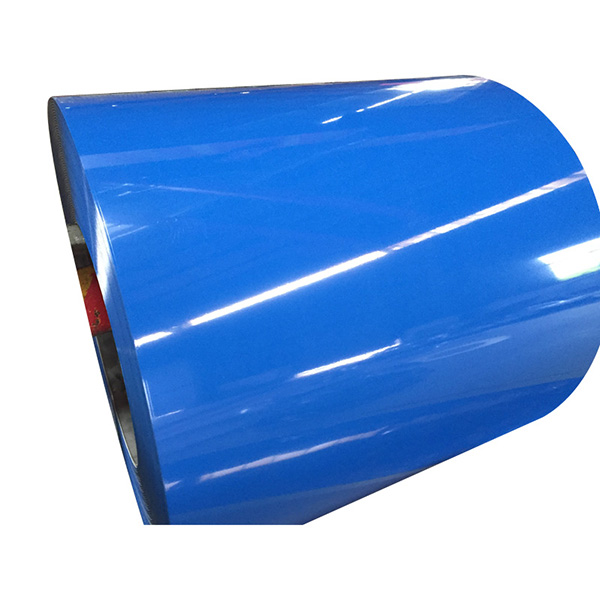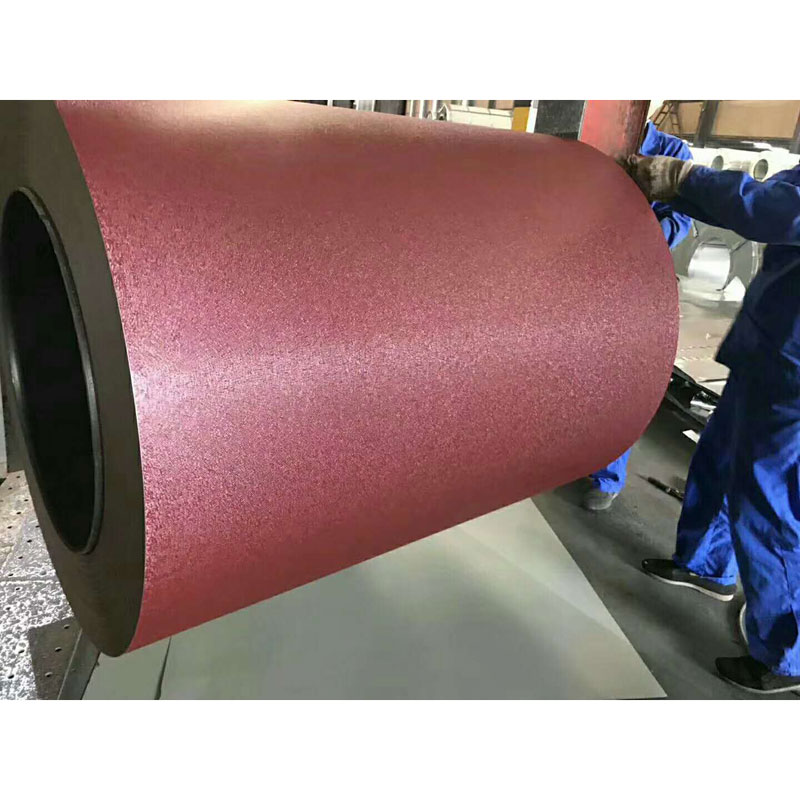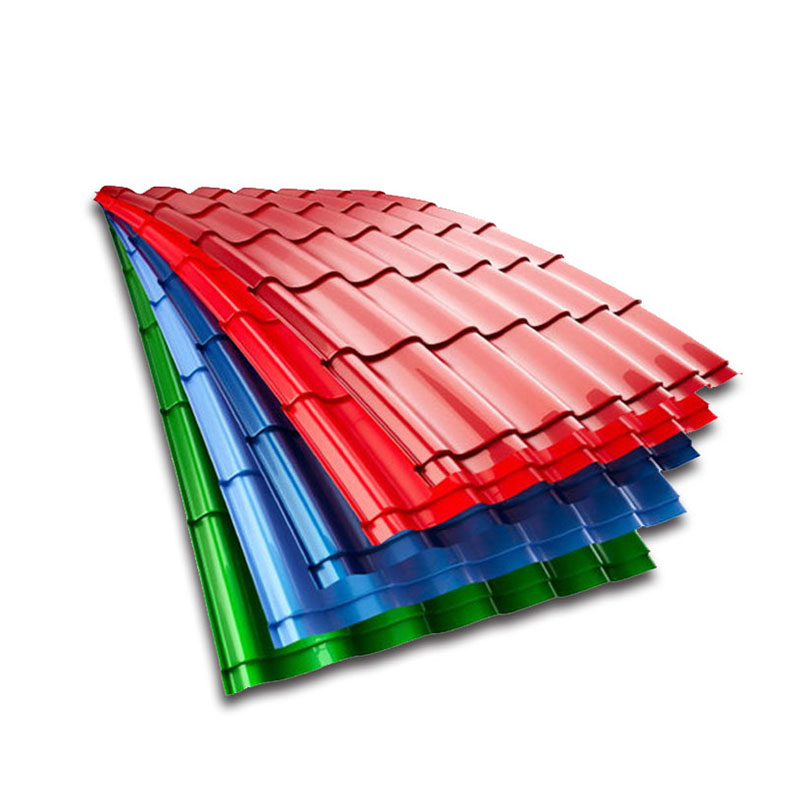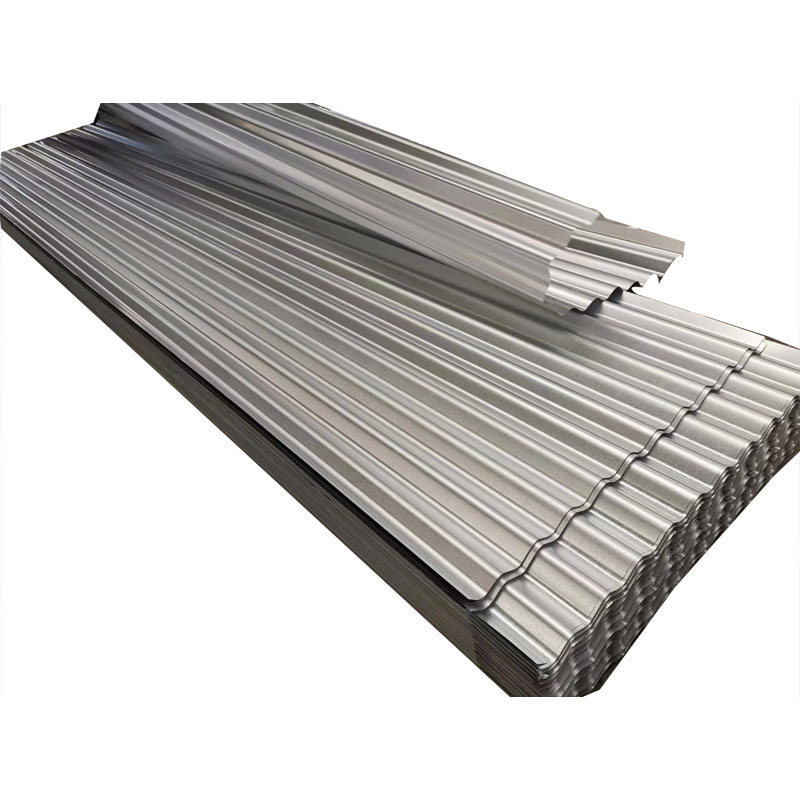No, not all prepainted galvanized steel coil suppliers offer the same price. Prices vary widely due to supplier bargaining power, quality control standards, and order size. Suppliers with strong market competition or better payment terms often provide more favorable pricing. High-quality coils cost more because they follow strict international standards and undergo thorough testing. Large orders usually receive significant discounts, reflecting volume-based pricing. Buyers must compare not only price but also the overall value and service provided.
Key Takeaways
- Prices for prepainted galvanized steel coils vary due to raw materials, coating types, quality standards, order size, and supplier reputation.
- Higher steel grades, thicker coils, and advanced coatings like PVDF increase costs but improve durability and performance.
- Large orders often get bulk discounts, lowering the price per ton and improving overall value.
- Choosing suppliers with strong certifications and quality testing ensures reliable products and reduces risks.
- Buyers should request detailed quotes that include all costs like shipping, taxes, and certifications to avoid hidden fees.
- Building long-term relationships with trusted suppliers leads to better pricing, support, and smoother project execution.
- Focusing only on the lowest price can cause quality issues, delays, and higher total costs over time.
- Effective negotiation and clear communication help buyers secure the best deals and value from suppliers.
Price Differences
Raw Materials
Steel Grades
Steel grade selection plays a major role in determining the price of prepainted galvanized steel coil. Higher-grade steel offers better mechanical properties and longer service life, but it comes at a premium. Thicker coils require more raw material, which increases the overall cost. Suppliers often provide a range of grades to meet different application needs, from construction to appliances.
Note: Coil thickness and steel grade directly impact both performance and price. Thicker coils and higher grades are more expensive due to increased material and processing requirements.
Coating Types
The type and quality of coating applied to the steel coil significantly affect its price. Zinc coating weight is a key factor—higher zinc content improves corrosion resistance but raises costs. Paint coatings also vary in price and performance. For example, polyester coatings are affordable and versatile, while PVDF coatings offer superior durability and color retention for a higher price. Custom colors, textured finishes, or special functional coatings (such as scratch resistance or anti-bacterial properties) further increase costs.
- Common coating types and their impact on price:
- Polyester: Good durability, cost-effective.
- PVDF: Excellent weather and chemical resistance, higher price.
- Polyurethane: Superior adhesion and flexibility, premium cost.
- SMP, PVC, Epoxy, Acrylic: Each offers unique benefits and price points.
Manufacturing
Technology
Manufacturing technology influences both quality and cost. Advanced coating lines require significant investment in equipment and skilled labor. Specialized processes, such as applying multi-layer coatings or using high-performance paints, increase production costs. Energy consumption during manufacturing also affects pricing, especially when energy prices fluctuate.
Scale
Production scale impacts supplier pricing. Large-scale manufacturers benefit from economies of scale, reducing per-unit costs. They can offer more competitive prices for prepainted galvanized steel coil, especially on bulk orders. Smaller producers may have higher costs due to limited production runs and less efficient operations.
Quality
Standards
Quality standards set the benchmark for product performance and reliability. Compliance with international standards such as JIS G3312 CGCC & CGLCC ensures consistent quality and market acceptance. Suppliers who adhere to strict standards often charge higher prices, reflecting the added value of certified products.
| Quality Factor | Description/Specification |
|---|---|
| Standards | Compliance with JIS G3312 CGCC & CGLCC, ASTM, or ISO standards ensures recognized quality benchmarks. |
| Hardness Grades | Soft and hard grades available for different applications. |
| Surface Finish | Options with or without protective film affect durability and appearance. |
| Zinc Coating Thickness | Ranges from 60-275 g/m², impacting corrosion resistance and price. |
| Paint Thickness/Type | Top side: 5 micron primer + 10-20 microns polyester; back side: 5-10 microns epoxy. |
Testing
Rigorous testing throughout the production process ensures that only qualified prepainted galvanized steel coil reaches the market. Manufacturers implement advanced quality management systems, conducting inspections from raw materials to finished products. This approach reduces defects and increases reliability, which justifies premium pricing. Suppliers who provide follow-up service assurance and detailed test reports build greater trust with buyers and can command higher prices.
Tip: Always request quality certifications and test reports when comparing suppliers. Reliable testing and documentation signal a commitment to quality and help justify price differences.
Order Size
Bulk Discounts
Order size plays a significant role in determining the price of prepainted galvanized steel coil. Suppliers often offer bulk discounts to buyers who place large orders. These discounts help manufacturers reduce inventory costs and streamline production schedules. Buyers who purchase higher volumes can negotiate better rates per ton. For example, a company ordering 500 tons may receive a lower unit price than a buyer requesting only 20 tons. Bulk discounts benefit both parties by increasing efficiency and lowering transaction costs.
Minimums
Most suppliers set minimum order quantities for prepainted galvanized steel coil. These minimums ensure that production runs remain cost-effective. Small orders may not justify the setup and operational expenses involved in manufacturing. Buyers who cannot meet the minimum order quantity may face higher prices or additional fees. Some suppliers remain flexible with minimums, especially for long-term clients or special projects, but most prefer larger, more consistent orders.
Location
Local vs. International
Location affects both price and lead time. Local suppliers can offer faster delivery and lower shipping costs. They may also provide better after-sales support due to proximity. International suppliers, such as those based in China or India, often offer lower base prices because of lower production costs and larger economies of scale. However, buyers must consider import duties, currency fluctuations, and longer shipping times. Choosing between local and international suppliers depends on project timelines, budget, and quality requirements.
Shipping
Shipping costs can significantly impact the total price of prepainted galvanized steel coil. Factors such as distance, shipping method, and fuel prices all contribute to the final cost. Ocean freight remains the most common method for international shipments, but it can add weeks to delivery times. Air freight offers faster delivery but at a much higher price. Buyers should always request detailed shipping quotes and clarify whether prices include delivery to their location. Some suppliers offer free or discounted shipping for large orders, while others charge separately.
Tip: Always confirm the shipping terms and delivery timelines before finalizing an order. Delays or unexpected costs can affect project schedules and budgets.
Brand
Reputation
Supplier reputation directly influences the price of prepainted galvanized steel coil. Well-known brands often charge a premium because they provide quality assurance and reliability. For instance, companies like ROGOSTEEL have built strong reputations by using high-quality raw materials, advanced German production technology, and maintaining a 100% pass rate on finished product testing. Their commitment to quality is supported by multiple ISO and industry certifications. Buyers trust these suppliers to deliver consistent products and excellent customer service. As a result, they are willing to pay higher prices for peace of mind and long-term value.
Trust
Trust forms the foundation of successful supplier relationships. Buyers prefer suppliers who demonstrate integrity, transparency, and a track record of customer satisfaction. Long-term partnerships with reputable suppliers can lead to better pricing, priority service, and access to new product developments. Trustworthy suppliers often provide detailed documentation, clear communication, and responsive after-sales support. These qualities reduce the risk of defects, delays, or disputes, making them worth the investment even if the initial price appears higher.
Services
Suppliers do more than just deliver steel coils. They often provide a range of services that add value and influence the final price buyers pay.
Customization
Customization stands out as a key service that can significantly impact cost. Buyers may request specific paint types, such as Polyester, Silicone-Modified Polyester, or PVDF. Each paint type offers different levels of durability and weather resistance. PVDF, for example, provides excellent longevity but comes at a higher price. Paint thickness also varies. Some projects require a thicker top coat or back coat for added protection, which increases material use and cost.
Color selection plays a major role in customization. Suppliers offer both standard and matt colors. Special colors or finishes may require unique pigments or extra processing steps, raising the price. Protective films, ranging from 30 to 80 microns, can be applied to prevent scratches during handling and installation. This extra layer adds to the total cost but helps maintain product quality.
Suppliers also provide additional processing services, including:
- Forming and bending to meet project specifications
- Cut to length processing for precise sizing
- Coil slitting to create narrower strips
- Sample testing to ensure product meets requirements
These services allow buyers to receive materials ready for immediate use, reducing waste and saving time on the job site.
Support
Support services help buyers throughout the purchasing process and after delivery. Reliable suppliers offer technical guidance to help clients choose the right materials and coatings for their needs. They answer questions about product performance, installation, and maintenance.
Many suppliers provide detailed documentation, such as test reports and certificates, to prove product quality. Some offer after-sales support, including assistance with claims or replacement in case of defects. Responsive customer service teams handle inquiries quickly, building trust and encouraging repeat business.
Note: Buyers should always ask about available services and support when comparing suppliers. These extras can make a big difference in total project cost and satisfaction.
Prepainted Galvanized Steel Coil Prices
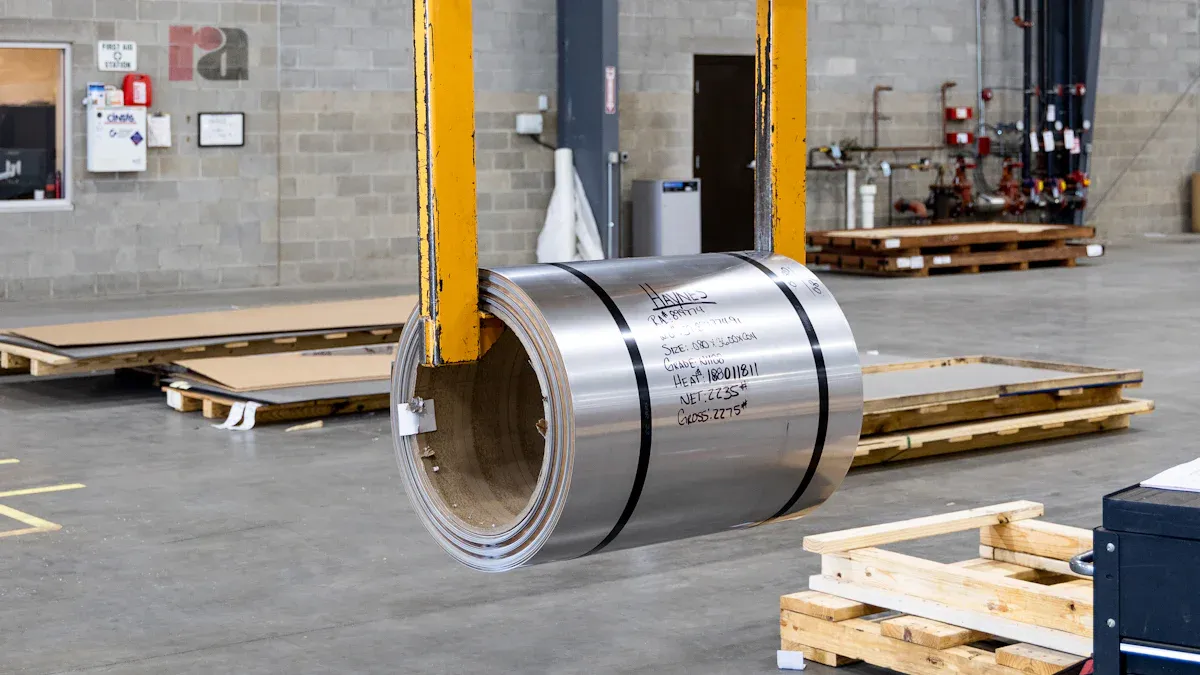
Market Range
Prepainted galvanized steel coil prices show significant variation across global markets. Most suppliers offer prices between $600 and $1,500 per ton, depending on product specifications and order size. In some regions, such as India, budget options can range from INR 40,000 to 50,000 per ton, which converts to roughly $480 to $600 per ton. These differences reflect local production costs, demand, and currency fluctuations.
Direct factory purchases often provide more competitive rates. For example, mill direct prices for prepainted galvanized steel coils typically fall between $500 and $750 per ton for minimum orders of 25 tons. Buyers who work directly with manufacturers can avoid extra markups from traders or distributors.
Supplier Comparison
Leading suppliers set their prices based on product type, quality, and minimum order requirements. The table below compares FOB price ranges for various steel products from top suppliers:
| Product Type / Specification | FOB Price Range (USD per Ton) | Minimum Order Quantity |
|---|---|---|
| Carbon Steel Coil | $453 – $477 | 4 Tons |
| Hot Rolled Steel Coil | $180 – $500 | 3 Tons |
| Galvanized Steel Coil | $565 – $620 | 1 – 6 Tons |
| Color Stone Coated Metal Roofing Tile | $615 – $690 | 3 – 5 Tons |
| Premium Cold Rolled Super Duplex Stainless Steel | $1,480 – $1,558 | 4 Tons |
| Hot Rolled Ribbed Bars (Rebar) | $493 – $512 | 8 Tons |
| Steel Profiles (SS400, S235jr, 304/316L) | $600 | 25 Tons |
| CRGO Lamination Silicon Steel | $900 – $2,000 | 3 Tons |
| Galvanized Corrugated Steel Roof Sheet | $670 – $690 | 3 Tons |
| Low-Carbon Steel Wire / Round Rod | $508 – $576 | 7 Tons |
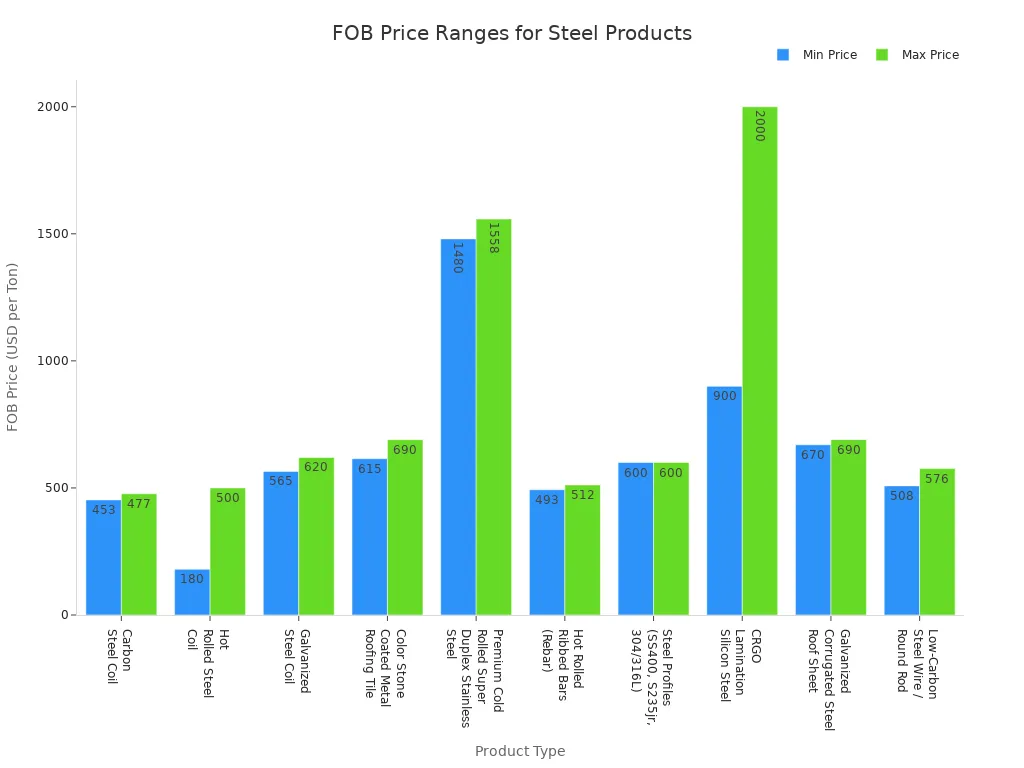
For prepainted galvanized steel coil, buyers should expect prices at the higher end of the galvanized steel range due to the added value of coatings and processing. Factory-direct options, such as those labeled “mill direct price,” consistently offer better value for large orders.
Factors Affecting Price
Several factors drive the price of prepainted galvanized steel coil. Buyers should consider these elements when comparing suppliers:
- Raw material costs, especially steel and zinc, have a direct impact on pricing.
- The coating process quality and the type of paint used determine durability and cost.
- Thickness and width specifications affect the amount of material used and the final price.
- Order volume influences pricing through bulk discounts or handling fees.
- Market demand and seasonal trends can cause prices to fluctuate.
- Geographical location affects transportation costs and overall pricing.
- Trade policies and tariffs may increase import or export expenses.
Tip: Buyers can use import price analysis to identify cost-effective suppliers and regions. Comparing prices across markets helps reveal the best opportunities for savings.
When evaluating offers, buyers should pay close attention to coating type (such as PE or PVDF), steel grade, and order quantity. These factors often explain why prices differ between suppliers. A detailed comparison ensures that buyers receive the best value for their investment.
Comparing Prices
Requesting Quotes
Buyers should approach the quoting process with clarity and precision. They need to define their requirements, such as thickness, width, coating color, and quantity, before contacting suppliers. This step ensures that suppliers understand the project scope and can provide accurate pricing.
To compare offers effectively, buyers should follow these steps:
- Clearly outline all specifications, including dimensions and any custom features.
- Identify reputable suppliers through research and industry recommendations.
- Request formal quotations from several suppliers using detailed inquiries by email or online forms.
- Specify delivery terms, such as FOB or CIF, to avoid confusion about shipping responsibilities.
- Ask for a full cost breakdown, including shipping, taxes, and handling fees, to uncover any hidden costs.
- Review supplier credentials and quality certifications before moving forward.
- Request product samples, especially for large orders, to confirm quality.
- Compare quotes not just on price, but also on quality, lead times, payment terms, and after-sales support.
- Confirm all details in writing, including delivery dates and payment conditions.
Tip: Buyers should avoid vague inquiries and always negotiate, especially for bulk orders. Clear communication helps prevent misunderstandings and ensures a smoother transaction.
Inclusions and Exclusions
A detailed quote should list all inclusions and exclusions. Buyers must check what each supplier covers in their offer. Some suppliers include inspection, certification, and delivery in the quoted price, while others may charge extra for these services.
Key items to review in every quote:
- Inspection and quality control fees
- Certification and documentation charges
- Shipping and insurance costs
- Packaging and handling fees
- Taxes, duties, and customs clearance
Buyers should ask suppliers to clarify any unclear points. They need to watch for hidden fees or extra charges that may appear later. Warranty terms and after-sales support should also be part of the discussion. Comparing these details helps buyers avoid unexpected expenses and ensures they receive full value for their investment.
Certifications
Certifications play a vital role in supplier selection. They show that a supplier meets international standards for quality, safety, and environmental responsibility. Important certifications include:
- ISO 9001 for quality management
- ISO 14001 for environmental protection
- SGS, CE, RoHS, and IBR for product compliance
Suppliers should provide Material Test Certificates (MTC) to prove compliance with standards like ASTM A755. These documents confirm that the product meets required specifications. Certified suppliers often offer higher quality and better reliability, which can justify a higher price. Customers may also request third-party inspections, such as SGS or BV, to verify product quality before shipment.
Note: Certifications build trust and add value. Buyers should always verify certificates and consider certified suppliers for critical projects.
Delivery
Delivery terms and logistics play a major role in the total cost and reliability of steel coil purchases. Buyers should always review delivery options and understand how each choice affects both price and risk. Suppliers offer several delivery terms, such as Ex-work, FOB, CIF, and CFR. Each term changes the point where responsibility and costs shift from the supplier to the buyer.
The following table outlines key delivery aspects that buyers should consider:
| Aspect | Details |
|---|---|
| Packaging | Secure bands, edge protectors, waterproof and metal wrapping protect coils during transit. |
| Delivery Time | Standard delivery takes about 25 days. |
| Delivery Terms | Ex-work, FOB, CIF, and CFR options affect cost and risk transfer points. |
| Container Types & Size | 20FT GP, 40FT GP, 40FT HP containers have different capacities and influence shipping costs. |
| Shipping Options | Full container load (FCL), less than container load (LCL), or bulk cargo impact fees. |
| Order Quantity Impact | Larger orders lower per-unit costs by maximizing container use and shipping efficiency. |
| Customization | Packaging and delivery can be tailored, which may change the total cost. |
Buyers should ask suppliers about packaging standards. Proper packaging prevents damage and ensures the product arrives in good condition. Delivery time also matters for project planning. Delays can disrupt schedules and increase costs. Choosing the right container size and shipping method can help control expenses. Full container loads usually offer better rates than smaller shipments.
Tip: Always confirm delivery terms in writing. Clear agreements help avoid misunderstandings and unexpected charges.
After-Sales
After-sales service adds significant value to any steel coil purchase. Reliable suppliers focus on customer satisfaction even after the product leaves the factory. They respond quickly to questions and resolve issues without delay. Fast response times show that the supplier values the buyer’s business.
Suppliers often provide the following after-sales services:
- Quick answers to customer inquiries and support requests
- Consistent quality assurance to maintain product reliability
- Competitive pricing that does not sacrifice quality
- Expert advice from experienced teams to solve technical problems
- Ongoing collaboration to meet customer needs and exceed expectations
Quality assurance continues after delivery. Suppliers may offer help with installation or provide guidance on product use. Some companies send follow-up surveys or check in to ensure the buyer is satisfied. These actions build trust and encourage long-term partnerships.
Note: Strong after-sales support reduces risk for buyers. It also helps resolve any problems that may arise, protecting the investment and ensuring smooth project completion.
Getting Value
Negotiation
Effective negotiation remains a key strategy for buyers seeking the best deal. Buyers should approach suppliers with clear requirements and a willingness to discuss terms. They can request detailed breakdowns of costs, including materials, coatings, and logistics. By comparing multiple quotes, buyers gain leverage to negotiate better prices or improved terms. Suppliers often respond positively to buyers who show knowledge of market rates and product specifications. Negotiation also extends to payment terms, delivery schedules, and after-sales support. Buyers who communicate openly and professionally often secure more favorable agreements.
Tip: Buyers who prepare thoroughly and maintain a respectful tone during negotiations often achieve better results.
Relationships
Building long-term relationships with suppliers offers significant advantages. When buyers establish ongoing partnerships, both parties benefit from clear contracts that define pricing, delivery, and quality standards. This clarity reduces misunderstandings and helps manage risks, such as supply disruptions. Over time, trust and open communication develop, making it easier to resolve issues quickly and efficiently. Suppliers value dependable customers and often prioritize them for reliability and product quality, not just low prices. This mutual respect encourages suppliers to offer better pricing and flexible terms.
Strong relationships also foster collaboration on contingency planning and risk management. Suppliers who view buyers as partners rather than one-time customers become more willing to share insights, suggest improvements, and provide technical support. This approach leads to stable costs, consistent supply, and fewer procurement risks.
Note: Long-term partnerships encourage suppliers to maintain high quality and competitive pricing, treating customers as valued partners.
Bulk Orders
Bulk purchasing provides a direct path to cost savings. Suppliers typically offer tiered pricing, where the price per ton decreases as order quantity increases. The table below illustrates how larger orders can lead to significant discounts:
| Order Quantity (tons) | Price per ton (USD) |
|---|---|
| 1 | 550 |
| 50 – 99 | 530 |
| ≥ 100 | 480 |
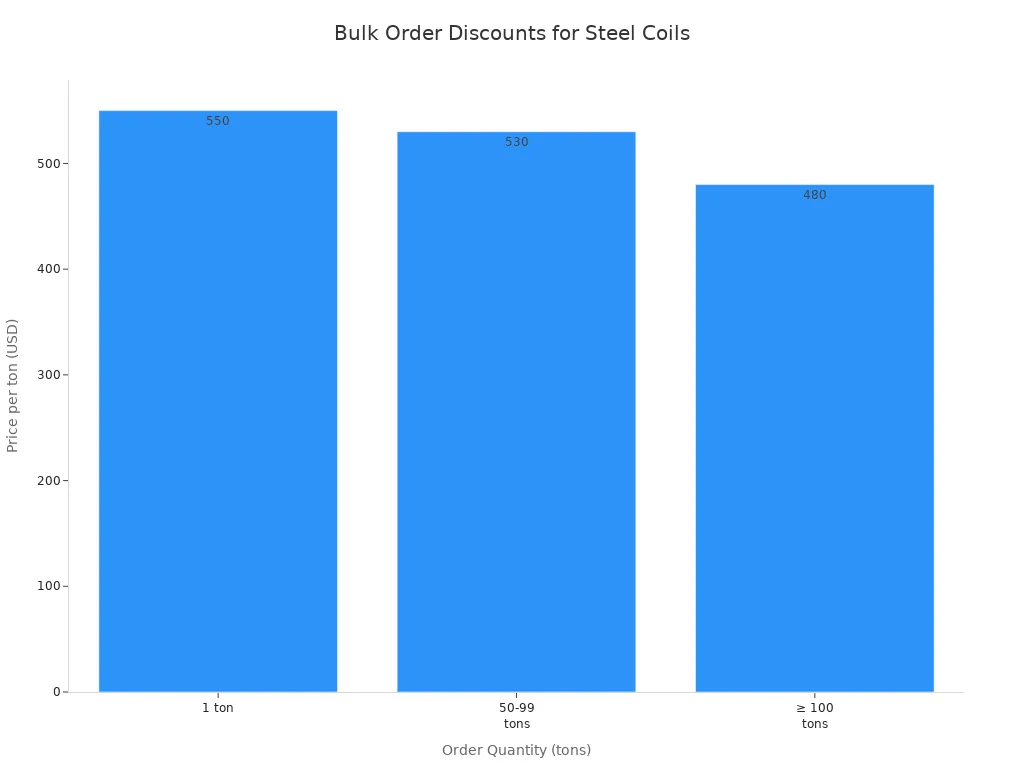
Some suppliers may offer additional discounts for long-term or repeat orders, though these rates are often negotiable. Buyers should always discuss potential savings when planning large purchases. Bulk orders not only reduce unit costs but also streamline logistics and simplify project management.
Remember: The lowest price does not always equal the best value. Buyers should consider total value, including quality, certifications, customization, and supplier reliability. High-quality coatings, strong warranties, and dependable logistics often justify a higher initial price by reducing long-term risks and costs.
Pitfalls
Focusing Only on Price
Many buyers make the mistake of choosing a supplier based only on the lowest price. This approach often leads to unexpected problems that can outweigh any initial savings. Selecting a supplier solely for their low price can result in:
- Products with poor or inconsistent coating thickness
- Unverified paint systems that fail under real-world conditions
- Premature fading, chalking, or corrosion of materials
- Project delays and increased costs due to material failures
- Damage to the buyer’s reputation if the finished product does not meet expectations
- Suppliers lacking technical expertise or reliable delivery schedules
- Missing certifications, such as ISO 9001 or ASTM, which signal poor quality assurance
Focusing only on price ignores important factors like supplier reputation, product quality, technical support, and production capabilities. These elements are essential for long-term project success.
Ignoring Quality
Quality should always remain a top priority when sourcing steel coils. Overlooking quality aspects, such as zinc coating thickness, can lead to higher costs over the product’s life. Thin zinc coatings do not provide enough corrosion protection, especially at cut edges where paint may peel away. This early corrosion, known as edge creep, shortens the service life of the steel and increases maintenance or replacement expenses. Zinc acts as a sacrificial layer, protecting the paint from corrosion underneath. When the zinc layer is too thin, the paint fails sooner, and the steel becomes exposed to the elements.
Producing thinner coatings may seem cost-effective at first, but it often leads to higher production costs and sometimes even higher selling prices. Sacrificing coating thickness to save money is a false economy. It reduces the lifespan and sustainability of the product while increasing total costs over time. Proper coating selection, based on environmental exposure and steel thickness, helps minimize corrosion and keeps long-term costs down.
Overlooking Total Cost
Some buyers focus only on the upfront price and ignore the total cost of ownership. This mistake can lead to budget overruns and project setbacks. The total cost includes more than just the purchase price. It also covers shipping, taxes, customs duties, installation, maintenance, and potential downtime from product failures.
| Cost Element | Description |
|---|---|
| Purchase Price | Initial cost of the steel coil |
| Shipping & Logistics | Freight, insurance, and handling fees |
| Taxes & Duties | Import/export charges and local taxes |
| Installation | Labor and equipment for setup |
| Maintenance | Ongoing care, repairs, and replacements |
| Downtime | Lost productivity from failures or delays |
Buyers who consider only the initial price risk missing hidden costs that can add up quickly. A thorough cost analysis ensures better budgeting and project outcomes.
Not Checking Suppliers
Many buyers overlook the importance of thoroughly checking their suppliers before making a purchase. This oversight can lead to costly mistakes, such as receiving substandard products, facing delivery delays, or dealing with poor customer service. A reliable supplier ensures consistent quality, timely delivery, and dependable support throughout the buying process.
Buyers should follow a systematic approach to verify supplier reliability. The following steps help reduce risks and improve purchasing outcomes:
- Review Certifications
Confirm that the supplier holds recognized certifications, such as ASTM and ISO. These certifications demonstrate a commitment to quality assurance and compliance with industry standards. - Assess Industry Experience
Consider the supplier’s history and experience in the steel industry. Suppliers with a long track record often provide more reliable products and services. - Check Product Range and Specifications
Ensure the supplier offers the required product range and can meet specific technical needs. Review details like surface finish, coating thickness, mechanical properties, and corrosion resistance. - Verify Production and Supply Capabilities
Confirm that the supplier can handle the desired order volume and deliver on schedule. Reliable logistics and consistent supply are essential for project success. - Evaluate Customer Support
Test the responsiveness of the supplier’s customer service and technical assistance teams. Quick and helpful responses indicate a supplier who values customer relationships. - Compare Pricing and Value
Analyze pricing in relation to product quality and after-sales support. The lowest price does not always offer the best value if it comes with hidden costs or poor service. - Research Reputation
Investigate the supplier’s reputation by reading customer testimonials and case studies. Positive feedback from other buyers signals trustworthiness and reliability.
Tip: Always request product samples and inspect them for surface smoothness, uniform coating, and absence of defects. Measuring coating thickness and testing mechanical properties can reveal hidden quality issues.
A thorough supplier check protects buyers from common pitfalls such as uneven coatings, peeling, insufficient strength, or inaccurate dimensions. Reliable suppliers provide warranties and clear documentation, reducing the risk of disputes and ensuring long-term satisfaction.
Case Studies
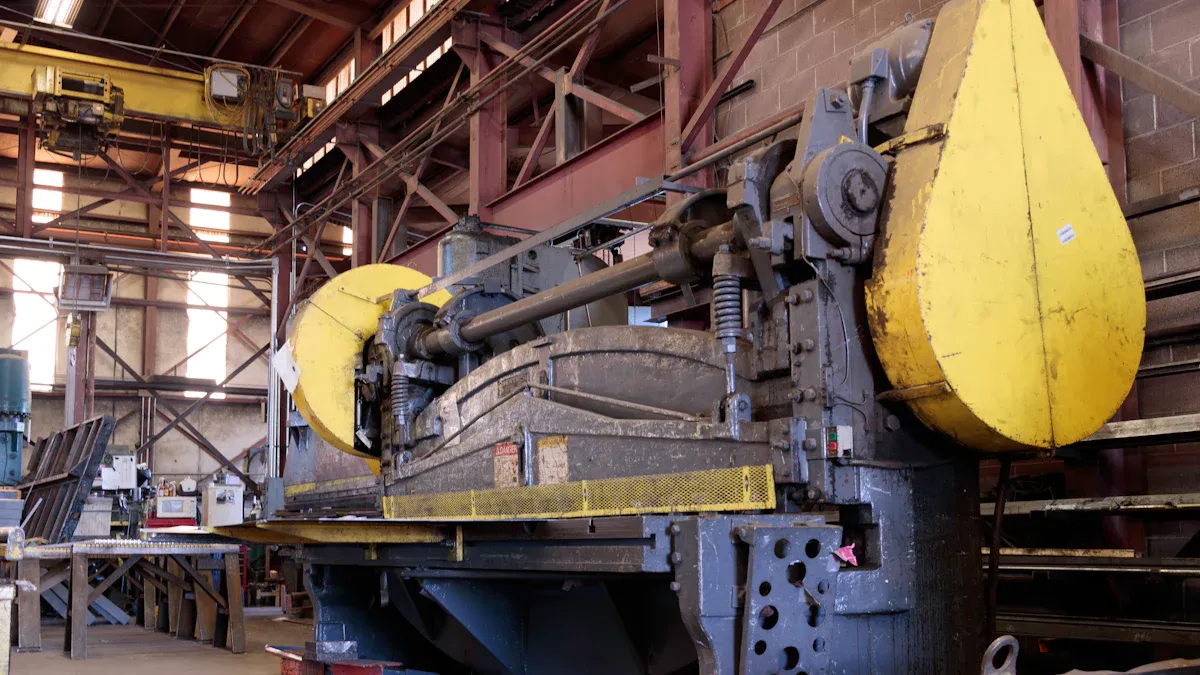
Price Scenarios
Steel buyers often encounter a wide range of pricing situations in the market. Some suppliers offer low prices to attract new customers, while others maintain higher rates due to established reputations or advanced technology. For example, a construction company in Southeast Asia compared quotes from three suppliers. The first supplier offered a low price but could not provide certifications or detailed test reports. The second supplier quoted a mid-range price and included ISO 9001 and ASTM certifications. The third supplier, known for premium quality, quoted the highest price and offered advanced coatings and full technical support.
| Supplier Type | Price Level | Certifications | Technical Support | Delivery Reliability |
|---|---|---|---|---|
| Low-Cost Trader | Low | None | Limited | Uncertain |
| Mid-Tier Manufacturer | Medium | ISO, ASTM | Moderate | Reliable |
| Premium Brand | High | ISO, ASTM, JIS | Extensive | Very Reliable |
Note: Buyers who choose the lowest price often face hidden costs, such as delays, poor quality, or lack of support. Those who select mid-tier or premium suppliers usually receive better value and fewer project risks.
Buyer Experiences
Buyers in the steel industry have learned valuable lessons when selecting suppliers. Their experiences highlight the importance of a comprehensive approach to supplier evaluation. Key takeaways include:
- Buyers achieve better results when they evaluate suppliers based on quality, certifications, and product performance, not just price. Certifications like ISO 9001, ASTM, JIS, and EN ensure safety and durability.
- Technical expertise from suppliers helps buyers select the right steel grades and coatings. Knowledgeable support solves fabrication issues and optimizes costs.
- A broad product range and customization options allow buyers to meet unique project needs. This flexibility reduces waste and improves efficiency.
- Value-added services, such as slitting, cut-to-length, and edging, increase operational efficiency and save costs.
- Reliable delivery schedules and responsive customer service keep manufacturing operations running smoothly.
- Buyers benefit most from suppliers who act as partners. These suppliers offer innovation, supply chain resilience, and long-term value beyond competitive pricing.
Tip: Successful buyers focus on building partnerships with suppliers who provide consistent quality, technical support, and reliable service. This approach leads to better project outcomes and long-term savings.
Prepainted galvanized steel coil prices show wide variation because of differences in quality, supplier reputation, and order size. Buyers should compare not only price but also value, including service and long-term costs. Careful evaluation of each supplier helps buyers avoid costly mistakes. By following these strategies, companies can make informed decisions and secure the best results for their projects.
FAQ
What is prepainted galvanized steel coil?
Prepainted galvanized steel coil is steel sheet coated with zinc and then painted. This process improves corrosion resistance and provides a decorative finish. Manufacturers use it in construction, appliances, and automotive industries.
Why do prices vary between suppliers?
Prices differ due to raw material costs, coating types, quality standards, and order size. Suppliers with advanced technology or strong reputations may charge more. Bulk orders often receive discounts.
How can buyers ensure product quality?
Buyers should request certifications like ISO or ASTM. They can also ask for test reports and product samples. Reliable suppliers provide clear documentation and support.
What is the typical minimum order quantity?
Most suppliers set minimum orders between 5 and 25 tons. Some may accept smaller orders for a higher price. Buyers should confirm minimums before placing an order.
Do suppliers offer customization options?
Yes, many suppliers provide custom colors, coatings, and sizes. Buyers can request specific paint types, thicknesses, or protective films to meet project needs.
Are shipping costs included in the quoted price?
Some suppliers include shipping in their quotes, while others list it separately. Buyers should always clarify shipping terms and delivery responsibilities before finalizing a purchase.
What certifications should buyers look for?
Key certifications include ISO 9001, ASTM, JIS, and EN. These standards ensure consistent quality and safety. Suppliers with these certifications usually offer more reliable products.
Can buyers negotiate prices with suppliers?
Yes, buyers can negotiate prices, especially for large or repeat orders. Suppliers may offer discounts, better payment terms, or added services to secure long-term business.
Tip: Always compare multiple quotes and review all terms before making a decision.


